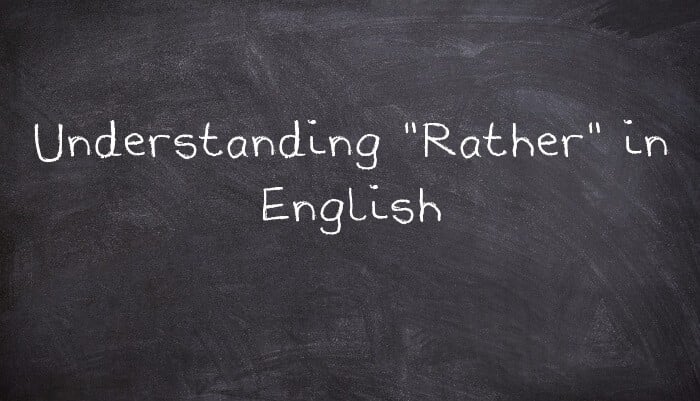When do we use rather in English?
"Rather" is a versatile word in the English language, often used to convey preference or degree.
A) We use rather as an adverb of degree
One of the primary uses of "rather" is as an adverb of degree. This means it's used to modify or emphasise the intensity or degree of an adjective or adverb.
Modifying an adjective
For instance, consider the sentence:
- The film was rather good.
Here, "rather" is used to modify the adjective "good," suggesting that the film was more than just good, but not quite excellent.
Modifying an adverb
Similarly, "rather" can also modify adverbs. Take a look at:
- It happened rather quickly.
In this case, "rather" emphasises the speed at which something occurred.
Notes:
- It is stronger than fairly, but not as strong as very.
- It can modify a noun, often coming before the article: It's rather a problem.
- It can modify some verbs: I rather like it.
B) To express preference
Rather than
"Rather than" is typically used to compare two parallel structures or choices. For instance:
- Let's take the train rather than the bus.
This sentence expresses a preference for the train over the bus. Other examples include:
- Rather you than me!
- I decided to write rather than email.
Would rather
"Would rather" is another way to express preference.
Would rather + infinitive without 'to':
- I'd rather leave now.
Would rather + pronoun + past tense:
- I'd rather he came early.
Common mistakes with rather
Confusing "rather" with "quite"
Both "rather" and "quite" can be used to modify adjectives and adverbs, but they don't always convey the same degree of intensity. For instance, "The movie was quite interesting" might suggest it was moderately interesting, while "The movie was rather interesting" implies a higher degree of interest.
Misplacing "rather" in a sentence
It's essential to place "rather" directly before the word it modifies. For example, "She is rather tall" is correct, while "She is tall rather" is incorrect.
Overusing "rather" for emphasis
While "rather" can be used for emphasis, it's essential not to overuse it, as it can make the writing seem repetitive and less impactful.
Using "rather" ambiguously
In some contexts, "rather" can be ambiguous. For instance, "The cake is rather sweet" could mean it's pleasantly sweet or too sweet. It's essential to provide context or choose more specific modifiers to convey the intended meaning clearly.
Synonyms of rather
-
Indicating Degree or Extent:
- Somewhat: This word can be used similarly to "rather" to indicate a moderate degree. For example, "The book was somewhat interesting."
- Fairly: This is another synonym that suggests a moderate degree or extent. "The task was fairly easy."
- Quite: Depending on the context, "quite" can mean "to a certain extent" or "completely." For instance, "The movie was quite entertaining" or "It's quite the opposite."
-
Expressing Preference:
- Preferably: This word can be used to indicate a more desirable option. "We should meet in the morning, preferably before 10 am."
- Instead: Often used to suggest an alternative. "I'll have tea instead of coffee."
-
Indicating Surprise or Unexpectedness:
- Surprisingly: Can be used to express something unexpected. "The results were surprisingly good."
- Unexpectedly: Similar to "surprisingly," it indicates something that wasn't anticipated. "He arrived unexpectedly early."
-
Used as a Conjunction (like "rather than"):
- Instead of: As mentioned earlier, it's typically used with nouns to indicate an alternative. "She chose the blue dress instead of the red one."
- In lieu of: A more formal way to suggest a replacement or substitute. "He gave a donation in lieu of flowers."
-
Indicating Reluctance or Hesitation:
- Hesitantly: Can be used to express a sense of reluctance. "He hesitantly agreed to the plan."
- Reluctantly: Indicates a lack of eagerness or enthusiasm. "She reluctantly accepted the invitation."
Phrases and Idioms with rather
- "I'd rather not": A polite way to decline or express reluctance.
- "Rather you than me": Used to say that you're glad you're not in someone else's situation.
- "Would rather die than": An expression to emphasise strong dislike or unwillingness to do something.
